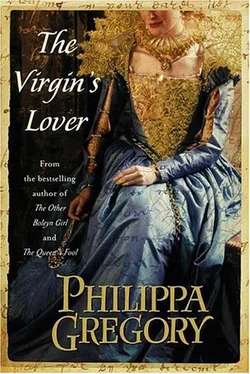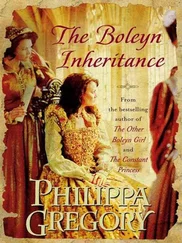Oh, have you not? Cecil hid his smile. “Nonetheless, I am sure of it.”
Dudley was silent for a moment, shocked by the news, but noting at the same time that Cecil had a spy in the very court of the Bishop of Rome. Cecil’s network of intelligencers and informers was growing to impressive proportions. “It is to overthrow the natural order,” he said. “She was anointed by one of his own bishops. He cannot do it. He cannot set the dogs on a sacred person.”
“He will do it,” Cecil said, irritated by the young man’s slowness. “Indeed, by now, he probably has done it. What we are considering is how to prevent anyone obeying it.”
“I was saying that she must be kept from the people,” Sir Francis said.
A bright laugh from the throne made all three of them break off, turn, and smile at where the queen was flirting with her fan and laughing at Ambassador Feria, who was colored up—torn between frustration and laughter. They all three smiled at her, she was irresistible in her joy, in her playfulness, in the brightness of her energy.
“The people are her greatest safety,” Dudley said slowly.
Cecil shook his head, but Sir Francis checked him with a hand on his sleeve. “What d’you mean?”
“The Pope makes this a matter of the common people, he invites them to attack her; but he does not know this queen. She should not hide from the few men or women who would do her harm; she should go out and draw the love of all the rest. Her greatest safety would be if every man, woman, or child in this country would lay down their lives for her.”
“And how would we achieve that?”
“You know it already,” Dudley said bluntly to Cecil. “You saw it. In the coronation procession she won every single heart in that crowd. We have to take the risk to take her out to the people and know that they will be the ones that protect her. Every Englishman should be one of the queen’s guard.”
Sir Francis slowly nodded. “And when it comes to an invasion they would fight for her.”
“A single man with a single poignard is almost unstoppable,” Cecil said bleakly. “She may win over a hundred, but if one is against her, and he is the one with the knife, then she is dead, and it is at our door.” He paused. “And a Catholic queen inherits, and England is a cat’s-paw of France, and we are ruined.”
“As you say, unstoppable,” Robert rejoined, not at all overwhelmed by the gloom of this picture. “But your way, you give her twenty guards, perhaps thirty. My way: I give her the whole of England.”
Cecil grimaced at the younger man’s romantic language.
“There will still be some places that we cannot admit the people,” Sir Francis pursued. “When she is dining, when she goes through the halls to her chapel. There are too many and they press too close.”
“That, we should restrict,” Robert concurred. “And we can serve her dinner without her being there.”
Cecil drew breath. “Without her being there? What is the purpose of that?”
“The people come to see the throne and the plate and the great ceremony,” Robert said airily. “They will come anyway. Provided that there is a good show they don’t need to see her in person. High days and holidays she must be there to show that she is well and in good spirits. But most of the time she can eat in private with her friends, in safety. As long as it is grand enough and the trumpets play and it is served in state, then the people will go away feeling that they have seen a good show. They will go away knowing that the country is wealthy and secure. That is what we need to do. We need to give them the show of the throne. The queen need not always be there herself, as long as everyone can feel her presence.”
“Serve her dinner to an empty throne?” Cecil demanded quizzically.
“Yes,” Dudley replied. “And why not? It’s been done before. When the young King Edward was sick they served his dinner on gold plates every night to an empty throne and the people came to watch and went away satisfied. My father ruled it so. We gave them a great show of grandeur, of wealth. And when they do see her, she has to be beloved, reachable, touchable. She has to be a queen for the people.”
Cecil shook his head but Sir Francis was persuaded.
“I shall speak with her about it,” he said, glancing back at the throne. The Spanish ambassador was taking his leave, he was handing over a letter sealed ostentatiously with the royal coat of arms of the Spanish emperor. With the eyes of the court upon her, Elizabeth took it and—apparently unaware that everyone was watching her—held it against her heart.
“I think you will find that Elizabeth understands how to put on a show,” Robert said drily. “She has never disappointed an audience in her life.”
Robert Dudley’s own steward came himself from London to escort Amy for the short journey to Bury St. Edmunds, and to bring her a purse of gold, a length of warm red velvet for a new dress, and her husband’s affectionate compliments.
He also brought a lady companion with him: Mrs. Elizabeth Oddingsell, the widowed sister of one of Robert Dudley’s old and faithful friends, who had been with Amy at Gravesend and then went with her to Chichester. Amy was glad to see the little dark-haired, brisk woman again.
“How your fortunes do rise,” Mrs. Oddingsell said cheerfully. “When I heard from my brother that Sir Robert had been appointed Master of Horse I thought I would write to you, but I did not want to seem to be pushing myself forward. I thought you must have many friends seeking your acquaintanceship now.”
“I expect my lord has many new friends,” Amy said. “But I am still very secluded in the country here.”
“Of course, you must be.” Mrs. Oddingsell cast a quick glance around the small, chilly hall which formed the main body of the square stone-built house. “Well, I hear we are to make a round of visits. That will be pleasant. We shall be on progress like a queen.”
“Yes,” Amy said quietly.
“Oh! And I was forgetting!” Mrs. Oddingsell unwound a warm scarf from her throat. “He has sent you a lovely little black mare. You are to name her as you please. That will make our journey merry, won’t it?”
Amy ran to the window and looked out into the yard. There was a small escort loading Amy’s few trunks into a cart, and at the back of the troop was a sweet-faced black mare, standing quite still.
“Oh! She is so pretty!” Amy exclaimed. For the first time since Elizabeth’s coming to the throne she felt her spirits lift.
“And he sent a purse of gold for you to settle his debts here, and to buy yourself anything you might like,” Mrs. Oddingsell said, delving into the pocket of her cape and pulling out the money.
Amy took the heavy purse into her hand. “For me,” she said. It was the most money she had held for years.
“Your hard times are over,” Mrs. Oddingsell said gently. “Thank God. For all of us, the good times have come at last.”
Amy and Mrs. Oddingsell started their journey a little after dawn on a cold winter morning. They broke their journey at Newborough, and rested two nights, then they went on. It was an uneventful journey marred only by the cold, the wintry darkness, and the state of the roads. But Amy enjoyed her new horse, and Mrs. Oddingsell kept her spirits up as they rode down the muddy lanes and splashed through icy puddles.
Mr. and Mrs. Woods at Bury St. Edmunds greeted Amy kindly, and with every appearance of pleasure. They assured her that she was welcome to stay as long as she liked; Sir Robert had mentioned in his letter that she would be with them until April.
“Did he send a letter for me?” Amy demanded. The brightness drained from her face when they said “No.” It was just a brief note to tell them when to expect her and the duration of her stay.
Читать дальше
Конец ознакомительного отрывка
Купить книгу












